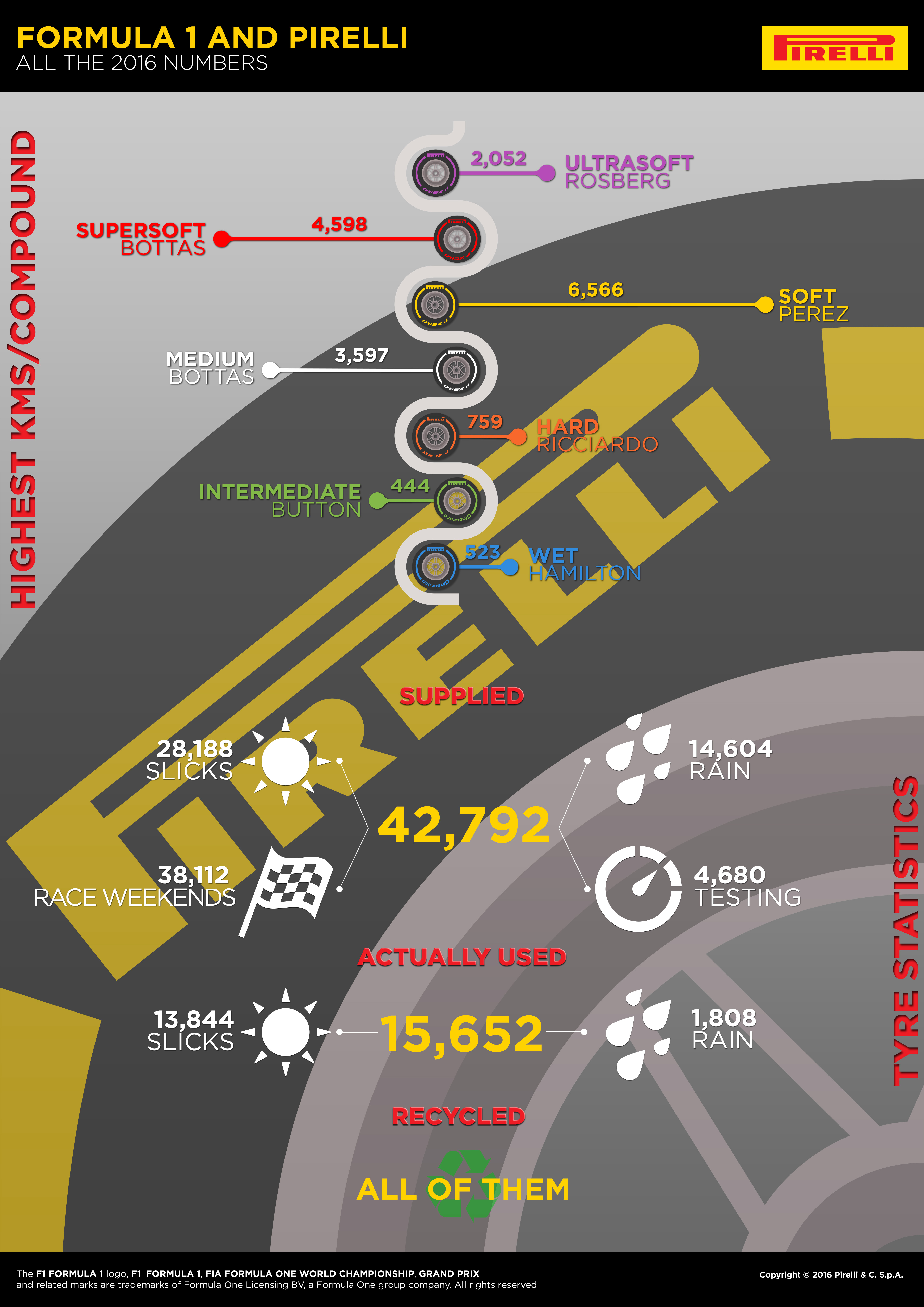42,792 tyres, 420 pizzas – Pirelli’s 2016 F1 stats

An enjoyable few minutes awaits Formula One fans with a bent for facts and figures – Pirelli has published all the numbers from the 2016 season. The statistics offer a glimpse into the logistics involved not only in supplying tyres for the flagship motorsport series, but also in keeping a wide range of protagonists and guests happy.
“This has been an incredible season both on and off the track: here are a few facts and figures as a souvenir of a year that will go down in history,” comments Paul Hembery, Pirelli’s motorsport director. “Pirelli has introduced a brand new compound – the ultrasoft – and also new regulations that allowed teams to use three compounds during each race, selected in advance. This extra tactical intrigue proved to be a highlight of the year, enhancing the show still further. We also had the final season of tyres with a deliberately high level of degradation, as from next year we adopt a new philosophy in line with the latest direction for the sport. At the same time as completing this season, we were testing for the next one: both using prototypes in 2016 dimensions, and then, from August, prototypes in 2017 size on adapted mule cars over 24 cumulative test days. As a result of that, and the biggest calendar ever featured in the sport, we completed a longer distance, at higher levels of performance, than has ever been seen before in the history of Formula One.”
Without further ado, here are Pirelli’s numbers for 2016….
Tyres
Total number of tyres supplied in 2016: 42,792
Of these, 38,112 were supplied for race weekends and 4,680 for testing
Of the 42,792 tyres, 28,188 were slicks and 14,604 were rain or intermediate tyres
Total number of tyres used during race weekends: 15,652, of which 13,844 were slick tyres and 1,808 were rain or intermediates
Total number of tyres that were recycled: all
Maximum number of kilometres driven on each compound (excluding tests):
Hard: 759 km (Daniel Ricciardo, Red Bull)
Medium: 3,597 km (Valtteri Bottas, Williams)
Soft: 6,566 km (Sergio Perez, Force India)
Supersoft: 4,598 km (Valtteri Bottas, Williams)
Ultrasoft: 2,052 km (Nico Rosberg, Mercedes)
Intermediate: 444 km (Jenson Button, McLaren)
Wet: 523km (Lewis Hamilton, Mercedes)
Pit Stops
Total number of pit stops: 933, of which 4 drive-throughs and one was a stop and go)
This makes an average of 44.4 per race, and 2.01 per driver in each race
Most pit stops in a race: 66 at the Chinese Grand Prix
Fewest pit stops in a race: 26 in Russia
Overtaking
Total number of overtaking manoeuvres during the season: 866 (*), with an average of 41.2 per race
Highest number of overtaking manoeuvres at a dry race: 128 in China (**)
Highest number of overtaking manoeuvres at a wet race: 64 in Brazil
Fewest number of overtaking manoeuvres at a dry race: 10 in Hungary
Driver with the most overtaking manoeuvres during the year: Max Verstappen, 78 (**)
Driver with the most overtaking manoeuvres at a single race: 18, Lewis Hamilton in China
Driver who has been overtaken least: Sebastian Vettel, one time (by Max Verstappen at the Brazilian Grand Prix, 66th lap, 5th position)
Driver who made up most places on the opening lap: Fernando Alonso, who gained 41 positions on the opening lap
Team that carried out most overtaking: Red Bull, 136 moves (**) – 61 by Daniel Ricciardo, 60 by Max Verstappen, 15 by Daniil Kvyat
Team that has been overtaken least: Mercedes, seven times (Nico Rosberg four, Lewis Hamilton three)
(*) How overtaking moves are calculated: an overtaking manoeuvre is counted as one that takes place during complete flying laps (so not on the opening lap) and is then maintained all the way to the lap’s finish line. Position changes due to major mechanical problems or lapping/unlapping are not counted.
(**) It’s the highest value since 1983 (the first year since when data is available)
Circuits and racing
Longest race of the season: Brazil, three hours, one minute and 01,335 seconds
Shortest race of the year: Italy, one hour, 17 minutes and 28,089 seconds
Fastest race of the year: Italy, winner’s average speed (Nico Rosberg), 237.558 kph
Highest speed reached by a Pirelli P Zero Formula One tyre during a grand prix: 372.5 km/h, Valtteri Bottas in Mexico (*)
Highest number of fastest laps: Lewis Hamilton, 15 (3 in races and 12 in qualifying)
Highest number of laps led: 566 (Lewis Hamilton)
(*) New record in an official F1 session (previous: 370,1 kph, Kimi Raikkonen at the Italian Grand Prix, 2005)
2017 wider tyre tests
Number of prototypes tested: 96
Tyres’ width: +25%
Teams involved in Pirelli’s testing programme: 3 (Ferrari, Mercedes, Red Bull)
Drivers involved: 11, of which 4 Ferrari, 4 Red Bull and 3 Mercedes
Days of testing: 24
Laps: 2,613
Total of kilometres: 12,148 km
Circuits: 5 (Abu Dhabi, Barcelona, Fiorano, Mugello, Paul Ricard)
Kilometres tested with wider tyres
Pascal Wehrlein (Mercedes): 3,248
Pierre Gasly (Red Bull): 2,494
Sebastian Vettel (Ferrari): 2,228
Sébastien Buemi (Red Bull): 1,190
Kimi Raikkonen (Ferrari): 1,054
Max Verstappen (Red Bull): 517
Esteban Gutiérrez (Ferrari): 480
Antonio Fuoco (Ferrari): 478
Nico Rosberg (Mercedes): 209
Daniel Ricciardo (Red Bull): 200
Lewis Hamilton (Mercedes): 50
Pirelli in F1 (since 1950)
Races: 320
Wins: 161
Pole positions: 164
Podiums: 490
Fastest laps: 168
Driver titles: 11
Team titles: 6
Other interesting numbers
Number of drivers (including third drivers and young drivers) who have driven a Pirelli-equipped Formula One car since 2010: 102
Kilometres driven by all the P Zero compounds throughout 2016 (including tests, practice, qualifying and races): 384,705 km (excluding prototype tyres)
By compound, it works out as: Hard 14,236; Medium 99,447; Soft 133,988; Supersoft 86,014; Ultrasoft 31,647; Intermediate 8,278; Wet 11,095
Distance covered in testing during 2016 (excluding race weekends): 61,772 km, of which over 12,000 km with 2017 Wider Tyres
Distance covered in races in 2016: 123,534 km
Number of fastest laps (in qualifying and races) set by the world champion in 2016: 14 (six in races and eight in qualifying)
Lowest average speed at which a dry race has been won in 2016: 159.992 kph (Nico Rosberg, Singapore Grand Prix)
Lowest asphalt temperatures recorded during a race (on Sunday): 15°C in Canada
Lowest asphalt temperatures recorded during a race weekend: 13°C in Mexico.
Highest asphalt temperatures recorded during a race (on Sunday): 59°C in Malaysia
Highest asphalt temperatures recorded during a race weekend: 61°C, again in Malaysia
Lowest ambient temperatures recorded during a race (on Sunday): 11°C in Canada
Lowest ambient temperatures recorded during a race weekend: 11°C in Canada
Highest ambient temperatures recorded during a race (on Sunday): 37°C in Malaysia
Highest ambient temperatures recorded during a race weekend: 37°C in Malaysia
Pirelli team and its guests
Pirelli team members who travel to each race: 60 (on average)
Nationalities represented within the Pirelli Formula One team: 9
Different languages spoken by team members: 10
Press releases written by Pirelli Formula One Team: 234
Infographics: 210
Tweets sent by @PirelliSport account via Twitter: 2,100
Pirelli notebooks distributed throughout the season inside the paddock: 2,550
Guests: 5,600
Pirelli podium caps sold: 15,000
Pirelli’s hospitality in 2016
Meals served within Pirelli’s hospitality unit (including tests): 15,600
Litres of water drunk in Pirelli’s hospitality during the year: 10,200
Kilograms of pasta cooked by Pirelli’s chef: 900
Pizzas cooked by Pirelli’s chef: 420
Number of different dessert recipes prepared at Pirelli’s Hospitality unit: 50
Desserts eaten at Pirelli’s hospitality: 7,500
Coffees served at Pirelli’s: almost 30,000
Litres of olive oil used during the year: 500



Comments